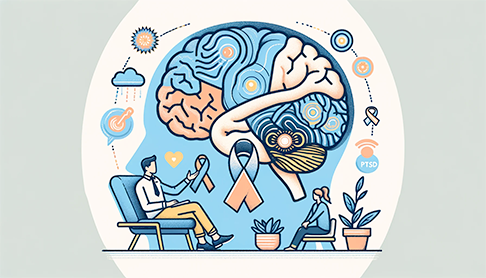PTSD Awareness Month: A Scientific Perspective on Mental Health
June 6th, 2024
 June is PTSD Awareness Month, a critical period dedicated to increasing understanding and awareness of Post-Traumatic Stress Disorder (PTSD). PTSD is a mental health condition triggered by experiencing or witnessing a traumatic event. This month highlights the importance of addressing PTSD with a scientific and evidence-based approach to improve mental health outcomes.
June is PTSD Awareness Month, a critical period dedicated to increasing understanding and awareness of Post-Traumatic Stress Disorder (PTSD). PTSD is a mental health condition triggered by experiencing or witnessing a traumatic event. This month highlights the importance of addressing PTSD with a scientific and evidence-based approach to improve mental health outcomes.
The Neurobiology of PTSD
PTSD is characterized by alterations in brain function and structure. Neuroimaging studies have identified changes in the amygdala, prefrontal cortex, and hippocampus. The amygdala, responsible for emotional processing, often shows heightened activity in individuals with PTSD. In contrast, the prefrontal cortex, which regulates emotional responses, may exhibit decreased activity, impairing its ability to modulate the amygdala’s response. The hippocampus, involved in memory formation, may also be reduced in size, contributing to the difficulties in distinguishing between past and present threats.
Symptoms and Diagnosis
PTSD symptoms can be classified into four main categories: intrusive thoughts, avoidance behaviors, negative alterations in cognition and mood, and hyperarousal. These symptoms must persist for more than a month and cause significant distress or impairment in social, occupational, or other important areas of functioning for a diagnosis to be made. The Diagnostic and Statistical Manual of Mental Disorders (DSM-5) provides standardized criteria for diagnosing PTSD.
Pathophysiology and Risk Factors
The pathophysiology of PTSD involves complex interactions between genetic, environmental, and psychological factors. Genetic predispositions, such as variations in the FKBP5 gene, can influence the risk of developing PTSD by affecting the hypothalamic-pituitary-adrenal (HPA) axis response to stress. Environmental factors, including the severity and duration of the traumatic event, also play a crucial role. Psychological factors, such as pre-existing mental health conditions and personality traits, can further modulate an individual’s response to trauma.
Evidence-Based Treatments
Effective treatment of PTSD often involves a combination of pharmacological and psychotherapeutic interventions. Selective serotonin reuptake inhibitors (SSRIs) are commonly prescribed to help manage symptoms. Psychotherapy, particularly trauma-focused cognitive-behavioral therapy (CBT) and eye movement desensitization and reprocessing (EMDR), has shown significant efficacy in treating PTSD.
Importance of Awareness and Research
Raising awareness about PTSD is vital for reducing stigma and encouraging individuals to seek help. Ongoing research is essential to develop better diagnostic tools and treatments. Advances in neuroimaging, genetics, and psychopharmacology continue to provide insights into the mechanisms underlying PTSD and potential therapeutic targets.
Supporting Those Affected
Support for individuals with PTSD includes providing access to mental health resources, encouraging professional treatment, and fostering a supportive environment. Public health initiatives and educational campaigns can play a crucial role in disseminating information and promoting mental health literacy.
Conclusion
PTSD Awareness Month emphasizes the need for a scientific understanding of PTSD to improve diagnosis, treatment, and support for those affected. By leveraging research and evidence-based practices, we can enhance the quality of life for individuals with PTSD and contribute to broader mental health advancements. This June, let’s commit to advancing our knowledge and compassion for those living with PTSD, recognizing that mental health is an integral part of overall health.
By integrating scientific research and community support, we can make meaningful strides in addressing PTSD and fostering a healthier society.
Take our PTSD course here PTSD: New Understandings and Interventions
This course delves into the latest research to explore how the body and mind respond to extreme stress and trauma, including the factors that may lead to a problematic response. Insights are drawn from recent studies on memory and the body’s neuro-hormonal reaction and regulation mechanisms. Additionally, the course provides an overview of contemporary biological, psychotherapeutic, and medication-based strategies for preventing and treating acute stress disorder and PTSD.